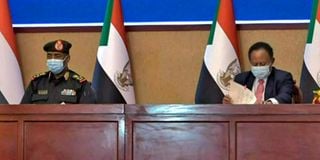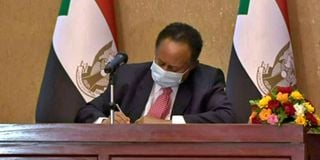Premium
Sudan army chief Abdel Burhan, PM Abdalla Hamdok sign power deal

A grab from an AFPTV video shows Sudan's top general Abdel Fattah al-Burhan (left) and Prime Minister Abdalla Hamdok during a deal-signing ceremony to restore the transition to civilian rule in the country in the capital Khartoum, on November 21, 2021.
Khartoum
Sudan’s political protagonists; leader of the military Abdel Fattah al-Burhan and ousted Prime Minister Abdalla Hamdok on Sunday formally signed a deal that will see the latter back to the post he had lost just during the coup.
Lt-Gen Burhan, who had been under pressure from both domestic opponents and the international community to hand over power to the civilian government, allowed Mr Hamdok to continue leading government. The prime minister had been under house arrest for a month.
The decision was part of a series made on Sunday, ostensibly to loosen the grip of the military on power and allow a much-needed civilian transition.
Earlier, Mr Hamdok had agreed to return to the PM’s post, something he had rejected for weeks since the coup on October 25 which also saw a number of his Cabinet members detained.
As a result, the junta lifted his house arrest, and they signed a deal to formally start establishing a new transitional government.
The agreement between Gen Al-Burhan and Mr Hamdok provides for the release of all political detainees in the country, while stressing the acceleration of the formation of transnational governance institutions.
The agreement also stressed that the constitutional document, known as the Constitutional Declaration, is the main reference for completing the transitional phase in Sudan. The two leaders, however, agreed it will need amendments to expand political participation.
Some civilian groups rejected the arrangement and had called for the resumption of the old transitional government.
Civilian leader
When the military engineered a coup last month, Gan. Burhan claimed he was in fact saving the transition from wrangles that had broken out. The timing, though, was suspect as it was just 30 days before the Transitional Sovereign Council the military had led since 2019 was to change hands to a civilian leader.
The Council is the topmost advisory body and included civilians and military leaders to act as an overall overseer of the transition project.
The agreement signed in Khartoum stresses the need to implement the Juba Peace Agreement, as well as forming a unified national army.

A grab from an AFPTV video shows Sudan's Prime Minister Abdalla Hamdok during a deal-signing ceremony with top general Abdel Fattah al-Burhan (unseen) to restore the transition to civilian rule in the country in the capital Khartoum, on November 21, 2021.
The Juba Agreement had seen former armed groups sign a coalition arrangement in exchange for laying down arms. It is unclear if the groups will return to the table after the coup.
The army had placed Mr Hamdok under house arrest when he announced his assumption of power on October 25, following a move led by Gen. al-Burhan.
The October 25 measures ended a transitional partnership between the army and civilian groups that helped oust President Omar al-Bashir in 2019.
After the signing, the head of the Sovereign Council, al-Burhan, said: “We stopped in the process of transition to reconsider the future steps.” He added: "We do not want any exclusion of any party in Sudan."
The Sudanese premier said he signed the deal to save the country from bloodshed. He said that the agreement would restore the path of democratic transition and preserve the gains of the past two years.
"When I accepted the assignment of the Chairman of the Transitional Council, I knew that the road was fraught with dangers,” he added.
And a few meters from the presidential palace, where the political agreement is signed, thousands of anti-coup protests were held. The protesters rejected any political agreement with the military. Security forces used tear gas to disperse the crowds, who chanted ‘the agreement is rejected"
Thousands of Sudanese gathered in Khartoum and 15 other cities, on Sunday to reject the new deal with the army. The Forces for Freedom and Change announced the Central Council's rejection of any agreement with the military.





